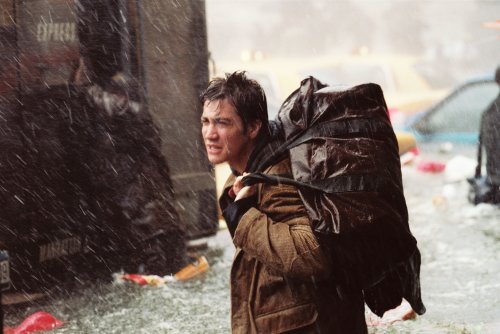If the emission of greenhouse gases into the atmosphere is not reduced immediately, the point of no return will be in ten years * An increase in drought, destruction of agricultural crops and water shortage is expected
26.1.2005
By: Avi Blizovsky

Image from the movie "The Day After Tomorrow".
The danger of global warming is closer than ever. This is according to a report by an international group. The countdown to the next climatic catastrophes is presented in the report of a task force that includes senior politicians, leading businessmen and academics from all over the world. According to this report, in no more than ten years, and most likely even less, we will reach the point of no return of global warming.
The report titled "Meeting the Climate Challenges" is intended for decision makers in all countries of the world, from national leaders on down. And it just so happens that it is being published at the same time as Tony Blair's plan to increase efforts to change climate policy as the chairman of both the G8 of the world's richest countries and the chairman of the European Union.
This is the first time that a document has been written by senior officials and which indicates the main dangerous points of global warming - the temperature will rise to such values that this will cause catastrophic changes. Among other things, the failure of agricultural crops on a large scale, lack of water and long droughts, an increase in epidemics, rising sea levels and the death of forests, and in addition there is the possibility of catastrophic events that will further accelerate global warming - such as the melting of the ice in Greenland or a change in the course of the Gulf Stream.
The report states that an increase in the average temperature by two degrees Celsius beyond that which prevailed in 1750 before the industrial revolution, was caused by human activity, such as waste gases such as carbon dioxide (CO2), which causes the preservation of the sun's heat in the atmosphere, will be the first effect of man on the climate . However, even so, the temperature has already risen by 0.8 degrees since then, and the next warming is already on its way - so humanity has one more degree before we reach the critical point.
Other visible news is that the concentration of carbon dioxide in the atmosphere may reach 400 parts per million. The current level is 379 parts per million and the rate is increasing by 2 parts per million per year - so we will reach 400 within 10 years or even sooner (although the temperature increase of 2 degrees may not manifest until later).
"There is an ecological time bomb," said Stephen Byers, the former British Transport Minister, who headed the task force jointly with Republican Senator Olympia Snowe. The report was compiled by the Melker Institute for Public Policy in the UK, the Center for American Progress in the US and an institute in Australia. The chief scientist who advised the team is Dr. Rakendra Pachauri, chairman of the UN's intergovernmental team on climate change.
The report urges the G8 countries to agree to produce a quarter of their electricity consumption from renewable sources by 2025, and to double spending on low-carbon energy research by 2010. They also call on the G8 to form an alchemical group with leading developing countries such as India and China that increase each Time the CO2 emission.
The report describes the consequence of not taking any action. "Beyond 2 degrees Celsius, the risk to societies and human economies will increase significantly" write the authors of the report.
In addition to drought and famine, there is also a danger to the coral reefs and the Amazon forests. And the report continues: "Above 2 degrees the risk increases and the runway is expected. Among other things, there is a fear of the melting of the giant glaciers in West Antarctica and Iceland, which could cause the sea level to rise by 10 meters within a few hundred years, stopping the marine flow cycle (including the Gulf Stream, without which Europe would be a desert like northern Canada at the same latitudes).
To the original article
Environmentalist - Earth
